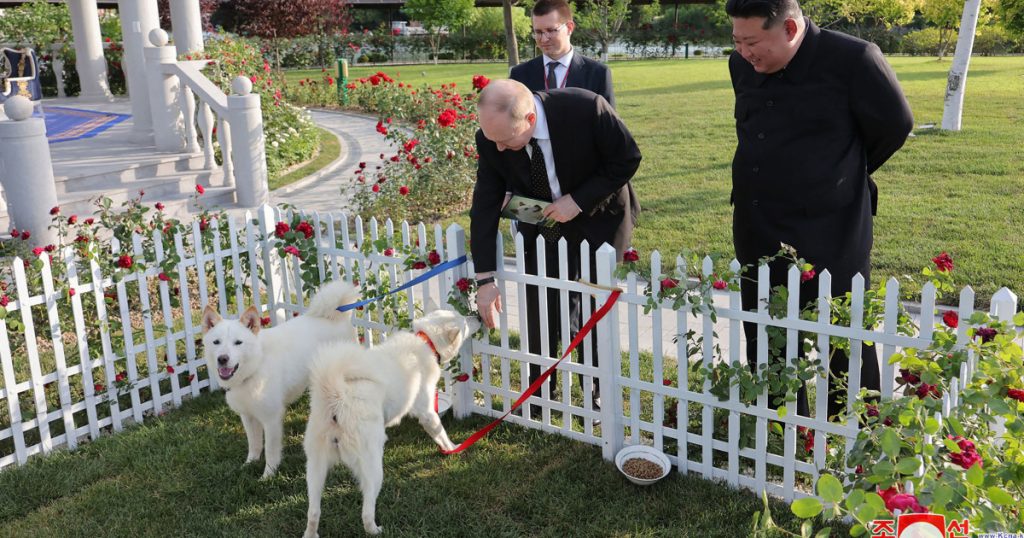North Korean leader Kim Jong Un gifted Russian President Vladimir Putin a pair of Pungsan dogs, a local breed, during a meeting as a gesture of goodwill. The two leaders were seen bonding over animals, with Kim feeding carrots to a horse and Putin patting it on the head. They also took turns driving each other around in a Russian-built Aurus limousine. Kim, known for his horse riding skills, has been photographed riding a white stallion on multiple occasions, with the horses holding symbolic meaning for North Korea. Putin, also known for his sporty image, has been pictured shirtless riding horses in photos released by Russian state media.
Pungsans are a breed of hunting dogs native to a region in northern North Korea and are considered a valuable and symbolic gift. Former South Korean President Moon Jae-in also received a pair of white Pungsans from Kim during a period of improved inter-Korean relations in 2018. This exchange of animals between leaders is not uncommon and serves as a symbol of friendship and diplomacy between nations. In addition to the dogs, a freight train carrying 30 gray thoroughbred horses headed to North Korea from Russia in 2022, marking a significant exchange between the two countries post-pandemic.
The relationship between North Korea and Russia has been the subject of international interest, with Kim Jong Un and Vladimir Putin both being known for their unique personalities and leadership styles. Their mutual interest in animals and shared experiences, such as horse riding, have been highlighted during their interactions. The gifting of animals and exchange of horses between the two countries further underscores the bond between North Korea and Russia. Such gestures are often seen as symbolic acts that aim to strengthen diplomatic ties and promote goodwill between nations.
The Pungsan dogs gifted by Kim to Putin are part of a larger tradition of exchanging animals as gifts among world leaders. Animals have long been used as symbols of friendship, loyalty, and peace, and the act of gifting animals can have significant cultural and diplomatic significance. The exchange of Pungsan dogs and thoroughbred horses between North Korea and Russia reflects the unique relationship between the two countries and the importance placed on these symbolic gestures. Such exchanges serve to build trust and understanding between leaders and nations, fostering positive relationships on both personal and diplomatic levels.
The media coverage of Kim Jong Un and Vladimir Putin’s interaction, specifically their bond over animals and shared experiences, has captured the attention of the international community. The images of the two leaders interacting with horses and dogs have provided a glimpse into their personal lives and interests. These moments of camaraderie and mutual appreciation for animals have humanized the leaders and created a sense of connection between them. The public display of their shared love for animals has served to strengthen their public image and enhance their diplomatic efforts.
Overall, the exchange of Pungsan dogs and thoroughbred horses between North Korea and Russia represents more than just a simple gift. It symbolizes the deepening of diplomatic relations between the two countries and the personal connection between Kim Jong Un and Vladimir Putin. The gesture of exchanging animals serves as a powerful tool for building trust, fostering goodwill, and promoting peace between nations. By highlighting their shared interests and demonstrating their willingness to engage in symbolic acts of friendship, Kim and Putin have reinforced their commitment to strengthening the ties between North Korea and Russia.


